Why Do Dogs Chew Their Paws? Well, if you’ve ever caught your furry friend gnawing on their own paws like they’re tackling the world’s tastiest chew toy, you’re not alone!🐶
It’s a behavior that can leave even the most experienced pet parents scratching their heads. But fear not, we’re diving deep into the whys and hows of this quirky canine habit.
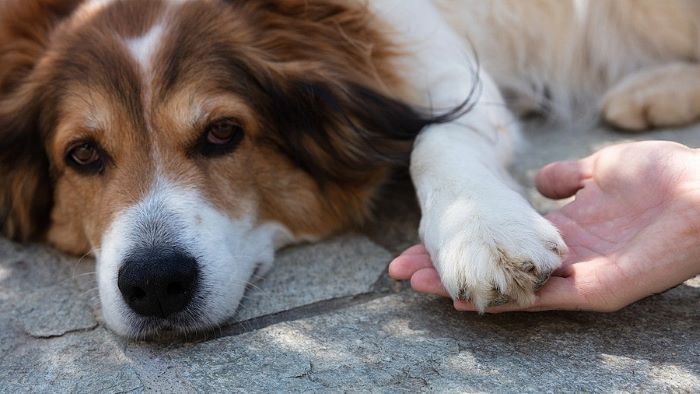
So, sit, stay, and get ready to uncover the mysteries of chewing, as we sniff out the reasons behind this curious canine conundrum!🐾
Why Do Dogs Chew Their Paws?
Paw chewing is a relatively common behavior in dogs. Paw chewing in dogs refers to the act of a dog using its mouth to lick, chew, or gnaw at its own paws.🐾It’s a repetitive behavior where the dog may focus on one or more of its paws, often accompanied by audible licking or chewing sounds.
Many dogs engage in occasional paw licking, which is considered normal grooming behavior. However, when it becomes excessive or turns into persistent chewing, it may indicate an underlying issue.
The prevalence of paw chewing can vary among dog breeds and individual dogs, with certain breeds being more prone to allergies and skin problems that can trigger this behavior. 🐕🦺 Here are some of the reasons from the experts of PetMD.
Allergies and Skin Irritations
Allergies and skin irritations are among the leading causes of paw chewing in dogs. Some dogs are allergic to specific ingredients in their food, leading to skin itchiness and paw chewing.
Pollen, dust mites, and other environmental allergens can trigger skin reactions, causing itching and paw chewing. Exposure to irritants like certain plants, chemicals, or cleaning products can lead to skin irritation and, subsequently, paw chewing. 🐶
Infections and Infestations
Dogs may chew their paws if they have bacterial or fungal infections. These can cause discomfort and itchiness in the paws. Fleas, mites, and ticks can irritate the skin and prompt paw licking and chewing as the dog attempts to alleviate the itching. 🦠
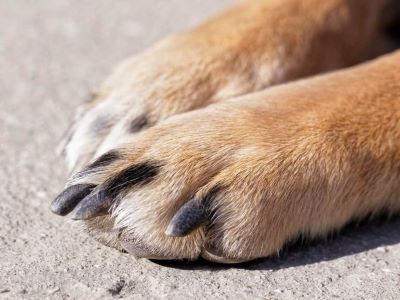
Anxiety and Stress
Dogs, like humans, can experience anxiety and stress. When anxious or stressed, some dogs may resort to self-soothing behaviors, such as paw chewing. Dogs left alone for extended periods may engage in paw chewing as a coping mechanism. Loud noises (thunderstorms, fireworks) or unfamiliar situations can trigger anxiety and lead to paw chewing. 🐶
Pain or Discomfort
Dogs may chew their paws if they are in pain or discomfort due to Arthritis or joint pain can cause dogs to focus on their paws to alleviate discomfort. Sometimes, dogs may step on sharp objects or sustain injuries that lead to localized pain in their paws, prompting chewing. 🛄
Boredom and Behavioral Problems
Dogs are active and intelligent animals. When they lack mental and physical stimulation, they may become bored. In an attempt to relieve this boredom, some dogs resort to repetitive behaviors like paw chewing, which can become a compulsive habit if not addressed. 🐾
Signs and Symptoms
These signs should be taken seriously, as they can be indicative of various underlying problems, including allergies, infections, pain, or stress, Let’s see them in detail:
- Redness or Swelling: Dogs that excessively chew their paws may develop visible signs of irritation. You might notice redness, swelling, or even open sores on the paws. These are indicators of ongoing discomfort and potential underlying issues.
- Chewing Sounds: When a dog is actively engaged in paw chewing, you may hear distinctive licking or chewing sounds. These sounds can be a clear indication that your dog is focusing on their paws and trying to alleviate some discomfort or irritation. 🦴
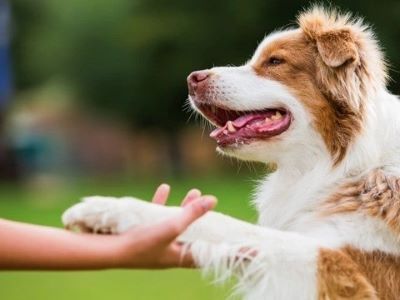
- Hair Loss: Excessive paw chewing can lead to hair loss in the affected area. Over time, this hair loss can result in bald patches on the paws. These bald patches are often a visible sign of chronic paw licking and chewing.
- Persistent Licking: One significant sign that something may be amiss is when a dog continues to lick and chew at their paws despite your efforts to intervene. If you’ve tried to redirect their attention or have implemented treatments, yet the behavior persists, it suggests an underlying issue that requires further investigation. 👅
- Behavioral Changes: Paw chewing can affect a dog’s overall behavior and demeanor. “Dogs experiencing discomfort or irritation in their paws may become restless, anxious, or irritable. They might exhibit signs of discomfort such as frequent paw lifting, limping, or a reluctance to walk”, by Dr. Jerry Klein at AKC.
Diagnosis
The diagnosis of paw chewing in dogs involves a multifaceted approach. The comprehensive approach ensures that the dog receives the appropriate care and relief from paw discomfort. Here’s an explanation of the diagnosis process for dogs showing paw-chewing behavior:
Veterinary Examination
When a dog is persistently chewing its paws, the first step is to seek a thorough veterinary examination. A veterinarian will conduct a physical examination to assess the overall health of the dog, paying close attention to the affected paws.
They will check for signs of redness, swelling, sores, or any visible abnormalities. This examination helps rule out any immediate issues and provides valuable clues for further investigation. 👩⚕️
Allergy Testing
Allergy testing is often a crucial component of the diagnostic process. Dogs can be allergic to various substances, including certain foods or environmental allergens like pollen or dust mites.
Allergy testing may involve skin tests or blood tests to identify specific allergens triggering the paw-chewing behavior. Identifying and addressing allergies can be instrumental in alleviating discomfort and stopping the paw chewing. 🧪
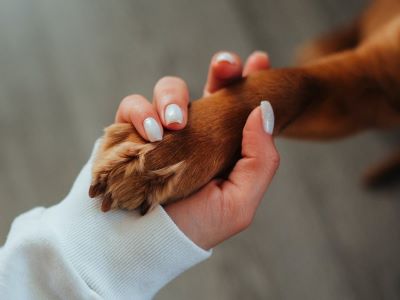
Skin and Blood Tests
To further investigate underlying causes such as infections or autoimmune conditions, veterinarians may recommend specific skin and blood tests. 🩸
Skin tests can help detect the presence of bacterial or fungal infections on the paws, while blood tests can reveal any systemic issues or abnormalities in the dog’s immune system. These tests provide essential diagnostic information to guide treatment decisions. 🧪
Rule Out Other Medical Conditions
Paw chewing may be a symptom of broader medical conditions that need to be ruled out. For instance, some orthopedic issues or neurological problems can manifest as paw discomfort or abnormal behavior.
By conducting a comprehensive examination and potentially utilizing diagnostic imaging techniques like X-rays or MRIs, veterinarians can ensure that other underlying medical conditions are not contributing to the paw-chewing behavior. 💊
Treatment and Management
The treatment and management of paw chewing in dogs involve a comprehensive approach. Regular monitoring of the dog’s progress ensures that the chosen treatment plan remains effective, ultimately providing relief and improving the dog’s quality of life.
Addressing Underlying Causes
Once the underlying cause of paw chewing is identified through veterinary diagnosis, treatment can be targeted to address the specific issue.
- For allergies, dietary changes, hypoallergenic food, and allergy medications may be recommended. In cases of infections, veterinarians may prescribe antibiotics or antifungal medications. 🐶
- Pain or discomfort due to orthopedic problems might require pain management strategies or joint supplements. Treating the root cause is essential to provide lasting relief from paw chewing.
- Behavioral problems associated with stress or anxiety may involve behavioral modification, training, or anti-anxiety medications. 🩹
Applying a soothing dog paw balm can also help protect the paws as they heal. Be sure to properly clean and dry the paws before application. Refer to our guide on how to apply dog paw balm for the proper technique
Preventing Further Damage
To prevent the dog from exacerbating the issue or injuring the paws further, measures like the use of Elizabethan collars (cone collars) or bandages may be employed. These prevent direct access to the paws.
- Regular paw cleaning and grooming can help keep the affected area clean and reduce the risk of secondary infections.
- Identifying and eliminating allergens or irritants from the dog’s environment can prevent recurring paw issues. 🛡️
- Flea control measures, such as regular topical treatments or medications, can prevent parasitic infestations that lead to paw irritation.
Bandaging the paws appropriately can help prevent the dog from causing more damage while they heal. Refer to our guide on how to bandage dog paw for proper bandaging techniques.
Monitoring and Adjusting Treatment
After initiating treatment, regular follow-up appointments with the veterinarian are crucial to monitor the dog’s progress.
- Veterinarians may recommend keeping a diary to track changes in the dog’s behavior and the severity of paw chewing.
- Based on the dog’s response to treatment, adjustments may be made. This could involve altering medication dosages, modifying the diet, or adapting behavioral interventions. 🔍
- A proactive approach to monitoring ensures that treatment remains effective and allows for timely adjustments if needed.
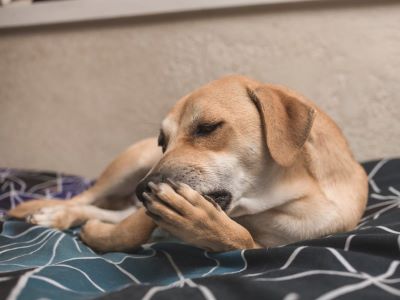
Preventive Measures
Proper Grooming and Hygiene: Regular grooming routines that include paw checks can help identify and address issues early on. Ensure your dog’s paws are clean and free from foreign objects. Keeping the hair between the paw pads trimmed can reduce the accumulation of dirt and irritants. 🛁🐾
Regular Vet Check-Ups: These check-ups can help identify and address potential problems before they escalate. Professionals can advise on vaccinations, parasite control, and overall health to reduce the risk of infections and allergies. 🏥👩⚕️
Mental and Physical Stimulation: A mentally and physically active dog is less likely to engage in destructive behaviors like paw chewing out of boredom. Engage your dog in interactive play, provide puzzle toys, and go for regular walks to keep them stimulated and happy. 🎾🧠
Allergenic Substances: If your dog has known allergies, work with your veterinarian to identify and avoid allergenic substances, whether it’s a particular food ingredient or environmental allergens like pollen. Choose hypoallergenic products when possible, such as shampoos or cleaning supplies. 🚫
FAQs
Why Do Dogs Chew Their Paws Until They Bleed?
Some of the reasons dogs chew on their feet are due to anxiety, infections, boredom, and injuries. If your dog starts to bleed, has swollen skin, or begins losing fur, contact your vet as soon as possible.
Why Do Dogs Change Their Paws?
It’s normal for dogs to chew their paws, especially when they’re teething. However, paw chewing more than usual could be a sign of anxiety or stress, allergy, parasite, boredom, injury, etc.
Home Remedies to Stop Dogs From Chewing Paws?
Put 1⁄2 cup (120 mL) of baking soda in a bucket of warm water and soak your dog’s paws for 10 minutes. Repeat this 2 to 3 times a day for the best results. Use treats to keep your dog busy and still for 10 minutes.
Summary
In conclusion, Through this exploration, we’ve uncovered a world of potential reasons behind “Why do dogs chew their ps?”🐾 From allergies and infections to stress, pain, and even boredom, our furry companions can find themselves nibbling on their toes for a variety of reasons.
Understanding these causes is the first step towards providing our dogs with the care and comfort they deserve. Remember, if you ever catch your dog treating its paws like a snack bar, it’s essential to consult with a vet. 🥼
Together, you can identify the root cause and develop a plan to ensure your pup’s paws are happy, healthy, and free from the urge to chew. Products like the best paw balm for dogs uk can provide soothing relief when applied regularly. So, the next time your dog gives their paws a nibble, you’ll have a few tricks up your sleeve to help them put their best paw forward! 🐶🐾



